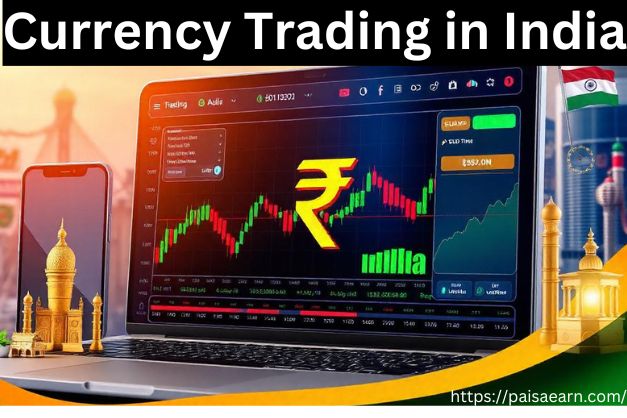Currency trading, also known as forex trading can seem complicated for beginners, but with the right guidance, you can navigate the world of foreign exchange smoothly.
If you’re in India and looking to start trading currencies like the US Dollar (USD), Euro (EUR), Japanese Yen (JPY) or British Pound (GBP), this guide will take you through all the essential steps.
Let’s explore how currency trading in India works, how you can get started and some tips for new traders.
What Is the Currency Market?
The currency marke or foreign exchange market (forex) is a global marketplace for buying and selling currencies. It operates across various time zone and is open 24 hours a day, 5 days a week.
In India, currency trading mainly occurs through the National Stock Exchange (NSE) and Bombay Stock Exchange (BSE), where traders can exchange currency pairs such as USD/INR, EUR/INR, and more.
There are two types of currency market:
- Interbank Market: Large-scale trading between banks.
- Over-the-Counter (OTC) Market: Where individuals like you can trade currencies via brokers or online platform.
Understanding Currency Pairs
Currencies are always traded in pairs, such as USD/INR (US Dollar against Indian Rupee). In every pair, there’s a base currency and a quote currency. In this example- USD is the base currency and INR is the quote currency. If the rate is ₹79, it means 1 USD equals ₹79.
How to Start Currency Trading in India
Here’s step-by-step guide to help you start trading currencies in India:
1. Open a Trading Account
To trade currency in India, the first thing you need is a trading account. Many brokers offer easy-to-use platform where you can sign up for free. Make sure your broker is regulated by SEBI (Securities and Exchange Board of India) for safe trading.
2. Understand Market Trends
Before diving in, it’s important to observe market trends. Currency trading requires understanding global economic factors. For instance- if you notice the INR is weakening against the USD, it may be a good time to buy US Dollars.
3. Start Small
Invest small amount at the beginning. Currency trading margins are relatively low, so you don’t need a huge amount to start. This will help you gain experience without risking large sums of money.
4. Set a Stop-Loss
Always discuss a stop-loss order with your broker. This automatically stops your trading if your losses hit a predetermined level, protecting you from larger losses.
When Can You Trade Currency in India?
In India, you can trade currency future and option during the regular market hours of 9:00 AM to 5:00 PM. Although the forex market is global and runs 24/7, Indian traders are subject to specific hours for currency trading.

Online Currency Trading – How to Get Started
Here’s how you can perform currency trading online in just a few steps:
- Choose a Broker: Pick a broker who offers a reliable and easy-to-use platform. Check for competitive fees and ensure they are SEBI-regulated.
- Set Up Your Trading Account: You’ll need to complete KYC process to activate your account. Once verified, you can start funding your account and trade immediately.
- Fund Your Account: Deposit the minimum amount required to start trading. Some brokers offer low deposit or allow you to use your existing stock market account.
- Select Currency Pairs: Choose from pairs like USD/INR, EUR/INR, GBP/INR and JPY/INR. Each pair offers different opportunities based on global market trends.
- Execute Your First Trade: Once you’ve chosen a pair, you can either buy or sell based on your predictions. Don’t forget to set up a stop-loss to manage risk.
Key Points to Remember Before You Start Currency Trading
- Start Small: Don’t rush into large trades.
- Monitor the Global Economy: Currency prices are influenced by events like US Fed decision, oil prices and geopolitical event.
- Stay Informed: Read daily updates and use tools provided by your broker to track currency movements.
Conclusion
Currency trading offers exciting opportunities, but it also comes with risk. To succeed, ensure you are well-informed, start with small investment and use smart strategies like stop-loss order. Forex trading in India is accessible and can be profitable if approached with caution and knowledge.
Frequently Asked Questions (FAQs)
Is currency trading legal in India?
Yes, forex trading is legal in India when done through authorized brokers and only for certain currency pairs, like USD/INR, EUR/INR, GBP/INR, and JPY/INR.
Can currency trading be profitable?
Yes, currency trading can be highly profitable, but it also carries risk. Ensure you understand the market and manage your investments wisely.
What are the most popular currency pairs to trade?
In India, USD/INR is the most traded pair, followed by EUR/INR, GBP/INR, and JPY/INR.
By following this guide, you’ll be better prepared to take your first steps into the exciting world of currency trading in India.





